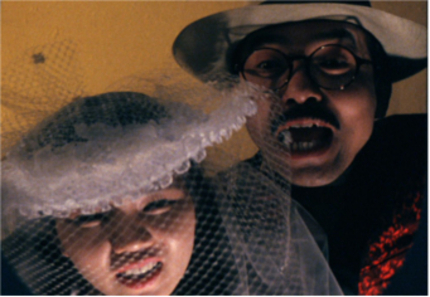Fantastic Fest 09: Everything You Need to Know About Yôjirô Takita's GROPER TRAIN

When Yôjirô Takita's Departures won the 2008 Academy Award for Best Foreign Language Film, there was a lot of grousing amongst film critics. So, one can only imagine what the critical establishment thought when word filtered out that Takita, like many Japanese directors, originally cut his teeth making pinku eiga.
In the world of pinku, Yôjirô Takita is best known as the director of the legendary series of Groper Train films. An upcoming Fantastic Fest screening of one of the Groper Train films (Wedding Capriccio from 1984) provides a convenient excuse to look at Takita's pinku phase. DVD label Pink Eiga kindly provided Wedding Capriccio, Time Trip Ninja, and Search for the Black Pearl for this overview.
Groper Train films, including Search for the Black Pearl and Wedding Capriccio, were often detective stories in which a man named Kuroda (Yukijirô Hotaru) was hired to solve a crime or a problem. Kuroda was paired with a female sidekick named Yuka, who was played by Yoshimi Kai. Takita occasionally changed up the routine. For example, Ninja Time Trip sent warring ninjas played by Yukijirô Hotaru and Yoshimi Kai forward in time to find a treasure. Of course, the first place they landed after traveling hundreds of years in time was on a train. Its also worth noting that there was a "groper bus" movie, which presumably follows the similar logic (or illogic).
It's easy to guess what happened when these films shifted to a train: groping. The loose pinku format (i.e., 60 minute film shot on 35mm for $30K with a set number of softcore scenes) allowed great latitude to integrate series-defining groping scenes no matter what was actually happening in the story. For example, the three films discussed here feature a brief setup that quickly shifts the action to the train. The films return to the train multiple times.
Production values were inherently ticky-tacky, but Yôjirô Takita's films had a few unique touches. Specifically, the films feature a lot of guerrilla camera work in public spaces. For example, groping scenes were filmed on real trains. The groper always felt up actresses while train passengers either stared or tried to ignore what was going on. The gropees were all actresses (presumably), but the films made it look like as if the women were just hanging around and waiting to be groped. Takita knew how to work the tight confines of a train with a camera. Quasi-sneak photography was extensively used , including lots of tight close-ups of hands poking around front and rear extremities. These shots could have easily been done off train, but the cramped conditions and the shadows indicate that they were done right on the train. The overall effect is kind of subversive and unsettling (women getting groped on trains is an real issue in Japan).
The other key element of Groper Train movies was super-stupid comedy. Women getting groped on a train doesn't sound like a ripe source of comedy but that didn't deter Yôjirô Takita from trying. In his book Behind the Pink Curtain, Jasper Sharp compared Groper Train humor to Benny Hill. This description is on point except that Benny Hill never took ink prints of women's privates (Search for the Black Pearl) or segued from a comical Close Encounters of the Third Kind homage to a sex scene with a blue fluorescent dildo (Wedding Capriccio). Quasi-sneak camera techniques were also used for comedic effect. In Wedding Capriccio, a character is shown driving a homemade "tractor" down a city street with people looking on. Ninja Time Trip is full of scenes of the two leads mugging it up in public spaces (trains, train stations, streets).
Films like Groper Train were never really intended to reach beyond the limited world of pinku eiga theaters and Japanese home video. Luckily, this era in Yôjirô Takita's career has been preserved for closer inspection: Pink Eiga is releasing Wedding Capriccio and Search for the Black Pearl later in the year. Groper Train raises all kinds of cultural and social red flags, but there is no point in a deep analysis. The films were intended as goofy prurient entertainment and that intent is still evident decades after their creation.

Do you feel this content is inappropriate or infringes upon your rights? Click here to report it, or see our DMCA policy.






